Our research in the School of Arts is interdisciplinary and international. These themes represent just some of the areas investigated by our passionate research active staff and postgraduate students:
- Transmedia storytelling
- Language of social media
- Game Studies
- Online grief and memorialisation
- Matariki as a contemporary festival
- Medical humanities
- Inclusive theatre practice
- Taonga pūoro
- The impacts of the pandemic
- Punkademia
- Opera Studies
- Visual Cultures of East Asia
- Arts Activism in a Changing Environment
- Embodiment and Creative Practice
- French colonial history and literary innovation
Research Passions
Below are some examples of staff and postgraduate student (PhD) projects that give a flavor of the breadth of research completed in our School.
Melody's research and creative work attempts to analyze and challenge the attitudes and social structures that exclude people often relegated to the edges of society. One of the responsibilities of storytellers is to provide a voice for the invisible as well as change cultural perceptions of what is considered “normal” or “ideal”. She is concerned specifically with the ideals that create expectations about what “healthy” and “ill” mean and what it means to be a “normal” woman.
These ideals create unnecessary barriers to belonging. Her current research focuses on the marginalization of women and girls, specifically, at the intersection of disability and gender, represented in contemporary film, literature, and comedy. She believes social change can occur with more positive representations of diverse characters. The more representations of intersections of ethnicity, class, sexuality, gender diversity, and abilities in literature and film, the better our world will become.
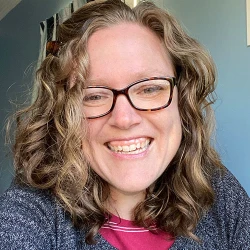
Dr Melody May, PhD Graduate, English
Dr. Andreea Calude is a linguist who works on various aspects of language analysis, including the language of social media - a channel of communication which is increasingly pervasive in our lives. Being on social media involves using language (in addition to pictures, animations, links and videos) to share or read information, and usually to do both.
Similarly to other domains of language use, as social media expands and grows, so does the depth and range of functions for its use. The nuanced ways in which users are engaging with social media indicated that the language of such platforms is often complex and sophisticated, and a far cry from the ungrammatical and error-laden communicative exchanges often assumed of them.
Generations of social media users, People 3.0, are linguistically savvy and strategic; they are skilled in navigating different genres and registers and they are able to develop a wide linguistic repertoire in order to "get things done" online.
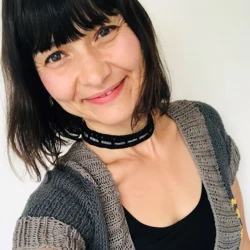
Dr Andreea Calude, Senior Lecturer General Linguistics
Dr Ann Hardy is a Pākehā [New-Zealand born] researcher and Lecturer who has been studying interlinked changes in both media and society for many years.
Ann thinks the growing influence of Māori and Polynesian ways of viewing life on the whole of Aotearoa New Zealand is the most important (and beneficial) thing that is happening in this country currently. Together with Professors Rangi Matamua and Hēmi Whaanga she curated a 3-year exhibition, Te Whaanau Maarama – the Heavenly Bodies at Waikato Museum, which the Prime Minister visited before deciding to make Matariki a new national holiday.
She has also written about film-maker Taika Waititi’s international reputation for tackling topics like dysfunctional families, queer relationships, and even the Holocaust, while still making people laugh, demonstrating that the arts have a unique power to change people’s minds and hearts.
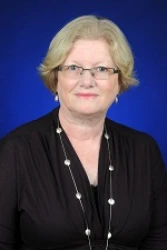
Dr Ann Hardy, Senior Lecturer Screen and Media Studies Writing Studies
Dr. Laura Haughey is an award winning theatre maker, director and dramaturg. She established Equal Voices Arts as Aotearoa's first professional touring Deaf and hearing theatre company, creating original bilingual and bicultural performances accessible to both D/deaf and hearing audiences. Her research with the company examines inclusive arts practice and non-hierarchical devising methodologies.
Laura's other areas of research are psychophysical training for performers and embodied mindfulness practices. What binds her work in these areas is a focus on how to improve psychophysical fluency for diverse performers to better communicate on stage to diverse audiences, and how artistic practice can impact on wellbeing.
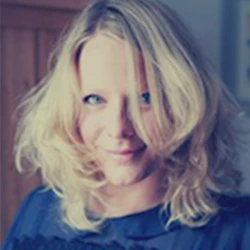
Dr Laura Haughey, Senior Lecturer Theatre & Dance
Rodrigo is an established exhibiting artist both in Aotearoa New Zealand and internationally specialised in gallery installations and publications. Rodrigo’s creative interests are rooted at the intersection of lens-based and documentary approaches in which photography plays the role of representing layered ‘place-imaginaries’.
Rodrigo is a lecturer at the University of Waikato School of Arts Screen and Media. Rodrigo’s research explores the multiple possibilities that surround photographic practices and how photography is used as a way to perceive and make place.
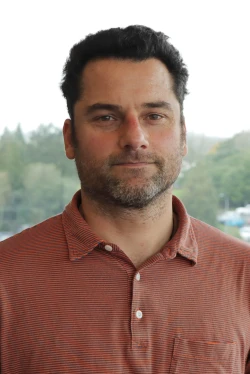
Dr. Rodrigo Hill Lecturer Screen and Media Studies